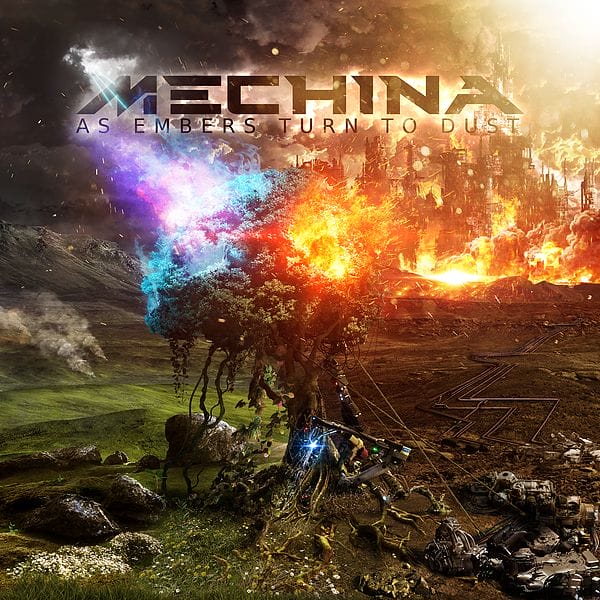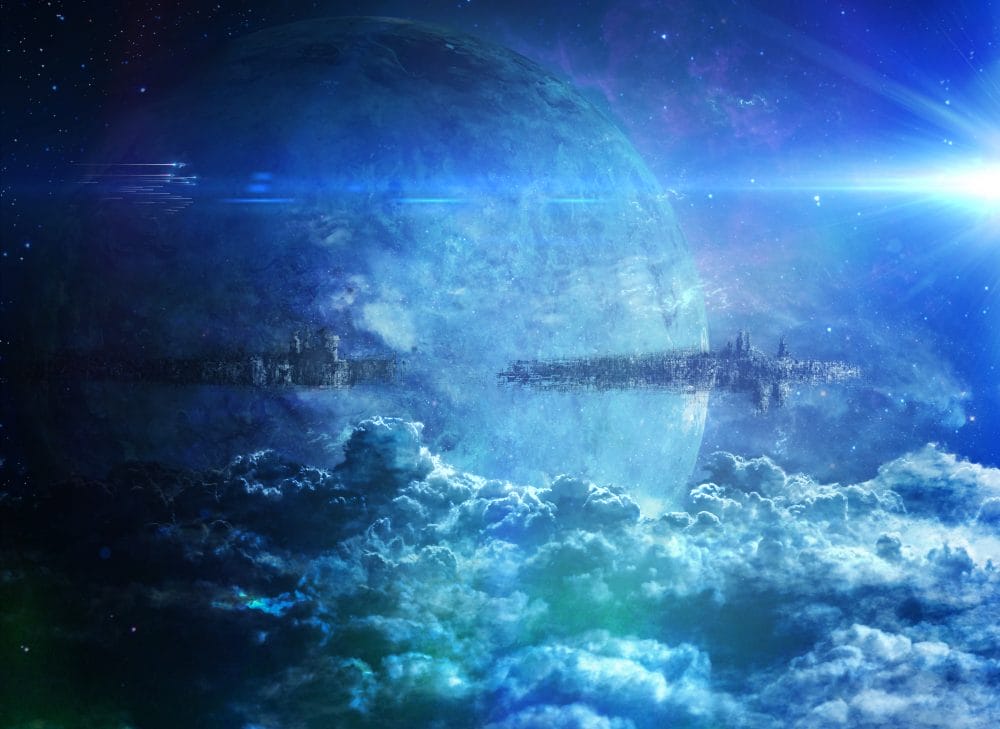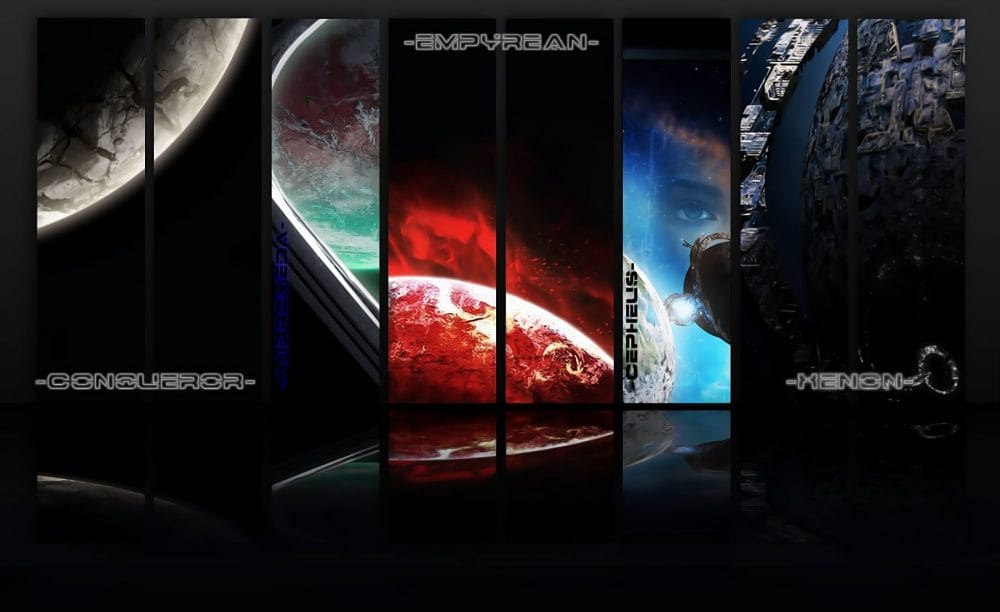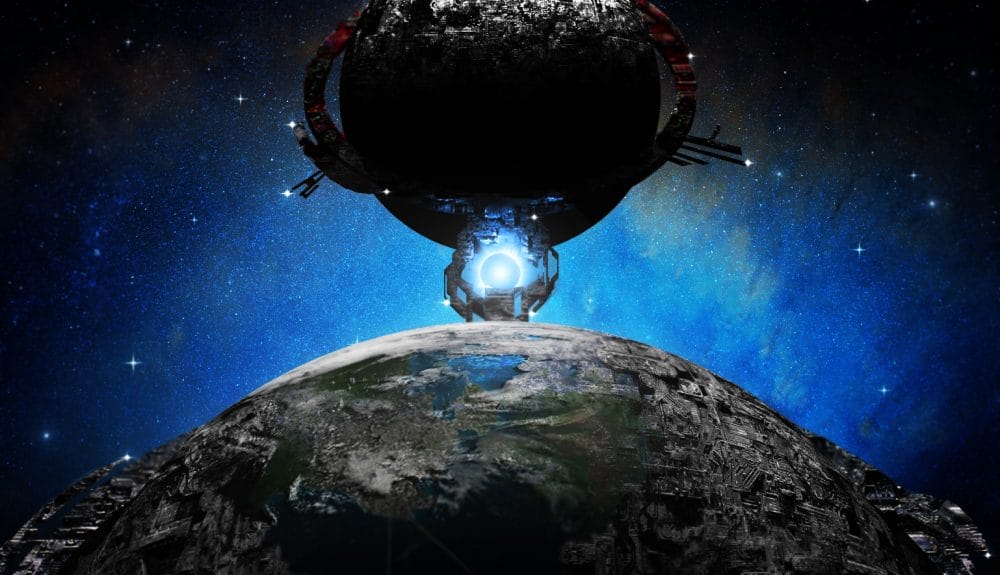Many bands have proven, that sci-fi and metal go very well together. MECHINA from the USA also tell such tales, but arguably more consequent than most other formations: Since 2011 the project releases a new album on the first day of the year and narrates an ongoing plot. Their newest entry in this story is called “As Embers Turn To Dust”. We spoke to Joe Tiberi and David Holch, the two musicians behind MECHINA, about the difficulties and advantages of executing such a vision.

On January 1st, you released your seventh full length album called “As Embers Turn To Dust”. Are you satisfied with this new release? How’s the response been so far?
David: The response has been extremely positive. We always try to “one up” the previous album, which I feel we have done again.
Joe: We allotted much more time towards preparation and logistics for this album, which in turn made it less chaotic towards the release date. I would consider „As Embers…“ as a success, within the realm of being a completely independent project, foremost. In regards to the response, I’m very grateful to receive kind words from people across the planet.
 Do you also play the music live or are you an exclusive studio project? If you do play live, how do you manage to recreate this special sound you have?
Do you also play the music live or are you an exclusive studio project? If you do play live, how do you manage to recreate this special sound you have?
David: We are a studio project primarily. We have played live in the past, but now just focus on creating material… that’s not to say we won’t play live ever again.
Joe: In the past days of playing live, we had to resort to backing tracks for the orchestra and industrial sounds. It really is the only way to present that sound live without an actual orchestra. That would be a dream come true though.
Looking at your release history, one can see that since 2011 you have released a new album every year (except in 2012) on the first day of the year. What is the reason for this special release date and the high rate of outputs?
David: Since we don’t play live we can dedicate our time to creating new material. Plus releasing an album each year keeps the momentum of the story going.
Joe: As Dave said, not pouring the time, money and resources into tours and shows allows us to dedicate time towards creating content. If we released albums every two to four years, the amount of down time could be very detrimental towards our reach. The yearly output has its ups and downs, and every year we learn so much about ourselves and writing music. We still have vast reserves of creativity, so it’s better to exploit that sooner than later.
The songwriting isn’t that simple, there are many layered arrangements and complex rhythm patterns. Do you think your creative process could improve, if you had more time between two releases than only one year?
Joe: Within the whirlwind of each album’s creation, there are many moments of doubt. Having more time could allow for more examination, but the rush of creating something so complex and demanding in such a short period of time has taught us so much about how we work.

Only having one year to produce an album, this time frame not only includes the time needed for songwriting and practicing, but of course also for recording, mixing and mastering the album. Do you do all this by yourself or do you have a regular studio you always go to?
David: Everything is done in house. Joe created his own personal studio that allows us to create, whenever and however we see fit.
The idea behind your band is highly conceptual. All six albums since “Conqueror” (2011) tell an ongoing science fiction story. Can you briefly summarize what the story so far is about?
Joe: I am currently in the process of sculpting out the story, within the six albums, for our upcoming box set. There is so much content that it is difficult to summarize. From the first album Conqueror all the way through As Embers Turn to Dust, there is roughly 500 years worth of time that passes. The story consists of conflicts on Earth, conceptual ideas regarding culture and logistics of space travel, building orbital habitats, colonization of two planets in Alpha Centuari, city sized terraforming machines and so on.

Your music is very bombastic and emotional symphonic metal, but also has this cold, dead, mechanical Fear-Factory-like industrial metal vibe. Why did you choose to combine those two genres which in terms of emotional expression aim for quite different characteristics?
David: Mainly because we like the way the two styles blend together, but the combination really lends itself to painting a picture of the story we are telling.
The new album is the first to name singer Mel Rose as a full-time member instead of guest musician, like you’ve done it in the past. What were the reasons for you letting her join the band and does that mean that future releases will have more songs with her vocals?
David: Having her talent added to the project allows for more character development. And she is just great to work with.
Joe: I have worked with Mel for years. Primarily on her solo work. As time went on we found that her voice worked so well with our sound. We plan on having her work on future material.
Are there any plans for releasing a music video for one of the new songs?
David: Not at this time.
 Although you’re active since 2004 and have released seven full length albums as well as several singles, you still aren’t signed with a label. Don’t you think a label could help you with better promotion of your music?
Although you’re active since 2004 and have released seven full length albums as well as several singles, you still aren’t signed with a label. Don’t you think a label could help you with better promotion of your music?
Joe: We had a few offers many years ago, but nothing seemed worth it. Since we are hesitant on touring, not many labels would be interested. We enjoy the freedom to do whatever we like, whenever we like. We have strives to be as self sufficient as possible, and although we suffer from a lack of exposure, our fanbase seems to be much more „grassroots“ and natural. I’ve always said that I would rather have ten thousand hardcore fans than ten million passive fans.
What are your personal musical influences that also go into the music of MECHINA?
David: My musical influences include Devin Townsend, Ludovico Einaudi, Meshuggah, Aborted, Peter Gabriel… this list could go on forever. The collection of musical influences between Joe and myself helps creating the contrast found throughout the project.
Joe: I grew up very much influenced by Dimmu Borgir, Fear Factory and Meshuggah. Although lately, I find myself listening to soundtracks and scores from movies and videos games.
Do you also listen to music beside metal music?
David: Absolutely, there is an immense amount of amazing music out there to only listen to one genre.
Joe: Most of the music I listen to now is not metal. I’m on the same page as David.

I would like to end the interview with our classical Metal1.info brainstorming. I will give you some keywords and you just write the first thing that comes to your mind:
Artificial intelligence: David: Getting there. – Joe: Hopeful yet skeptical
Star Wars: David: Original trilogy or nothing. – Joe: Lost interest.
Metallica: David: YEAH! – Joe: First metal band I ever heard.
Donald Trump: David: #trumpisfat – Joe: Not interested.
Aliens: David: Hopefully they show up soon… unless you mean the movie, in which case it is great! – Joe: High probability.